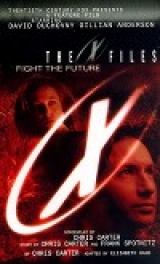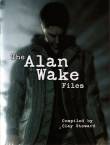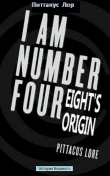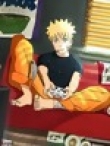
Текст книги "X Files: Fight the Future"
Автор книги: Chris Carter
сообщить о нарушении
Текущая страница: 3 (всего у книги 8 страниц)
CHAPTER 5
BLACKWOOD. TEXAS
The night breeze swept across the prairie relentlessly. After a while the wind seemed to rise, as though heavy weather was moving in.
Above the desolation of sage and dust, two black, unmarked helicopters appeared, swoop-ing perilously close to the ground.
They buzzed past, flying at dangerously low altitude toward their destination: several large, ominously glowing domes, duplicates of the moon's own reflection upon the prairie. Only a few hundred yards away, the commonplace lights of the housing development sparked the night, white and yellow and ice-blue where a television was on. But there was nothing com-monplace about the work site that had sprung up where, only days before, four young boys had knelt digging in the brick-colored earth.
Now, the white hoods of several geodesic dome tents stretched over nearly the entire patch of ground. They were surrounded by long white cargo trucks, their tanks devoid of any markings, and a number of anonymous support vehicles: cars, vans, pickup trucks. Between these, figures in black fatigues moved purpose-fully, their somber uniforms in stark contrast to the white Hazardous Materials suits worn by their counterparts who stepped in and out of the central dome and support tents.
Overhead the hum of the choppers became a drone, as the two aircraft banked and then slowly settled upon the ground. Dust devils spun up around them; tents billowed and tugged at their struts. The eerie daylight glow of the main dome washed over one of the heli-copters, as several men in fatigues gestured at the pilot. An instant later and the chopper's door swung open. A man stepped down, mov-ing with studied, almost casual ease as he shielded his eyes from the dust and blinding light. He lowered his head instinctively as he walked beneath the whirring propellers, head-ing to where a line of trucks provided a makeshift windbreak from the helicopter's prop wash. Once there, he stood with his back to it all—choppers, drones, the huge and weirdly glowing tent—and lit a cigarette.
"Sir?"
The Cigarette-Smoking Man replaced his light and inhaled, then turned to look at the uniformed man addressing him. "Dr. Bronsch-weig is waiting for you in the main staging area."
The Cigarette-Smoking Man regarded him through slit eyes, his weathered face dull gray in the dome's glare. His expression was cool, almost disinterested, but after a moment he nodded and without a word followed the other man across the field. At the entrance to the central dome, the uniformed man nodded curtly, indicating the bulky white form of someone in a Haz-Mat suit. "Dr. Smith will escort you inside," he said, and left.
"This way, sir." From behind his mask the man's voice sounded hollow and thin. He held open a vinyl flap, and the Cigarette-Smoking Man ducked beneath.
Inside, the dome was a maze of clear plastic tubing, translucent vinyl walls, and opaque barriers separating one work area from another. In between, in makeshift cubicles and plastic-sided alleys, men and women stood or sat before stainless steel tables. Some wore Haz-Mat suits or surgical masks; all had the intense, almost dreamy expressions of people engaged in work they had spent a lifetime preparing for. The tables were covered with vials and alem-bics and crucibles of glass, but also with home-lier instruments: hammers, chisels, sifters, and strainers, all the accoutrements of the archae-ologist's art. The entire place resembled a cross between a high-tech dig and a surgical operat-ing theater.
Or a modern abattoir. There were refriger-ation units everywhere, huge and linked by sheaves of electrical cords. The dome res-onated with their humming, and the faint sweetish smell they exuded. The Cigarette-Smoking Man passed them quickly and in silence, barely taking note of the hive of activ-ity around him, until finally he came to the entrance to the very center of the dome. Here he took the bulky white suit and mask that an underling handed him, donning it quickly before drawing aside the last vinyl flap and entering.
Inside was a small, partitionless area, banked roundabout with refrigeration units. It was cold, cold enough that the Cigarette-Smoking Man's breath clouded even inside his mask. Several metal gurneys were tucked beneath halogen lights and shrouds of plastic sheathing. In the middle of it all, a small mound of bare earth had been covered by a clear plastic cover, like a manhole cover: twelve inches thick, its transparent surface crisscrossed by heavy stainless steel bars. The walls of the earthen hole had been shored up by inserting a sort of metal tube into the ground, like a culvert, big enough for a man to pass through. It was this that the sturdy cover fit over, like a trapdoor. And it was from this entrance into the underworld that Dr. Bronschweig appeared, suited up, his head obscured by the cumbersome mask. He pushed aside the clear plastic hatch and stepped out as the Cigarette-Smoking Man approached him,
"You've got something to show me."
Dr. Bronschweig nodded. Not even his mask could hide his excited expression, or the nervous tone edging his voice. "Yes."
He pointed to the hatch, the ladder that could be glimpsed now leading into the earth. The Cigarette-Smoking Man slung himself down the hole, moving awkwardly in his suit as he went down the ladder. A moment later Dr. Bronschweig followed.
They were inside the cave, a frigid chamber lit by an array of halogen and fluorescent lights. "We brought the atmosphere here back down to freezing in order to control the develop-ment," he explained.
"And that development is like nothing we've ever seen…"
The Cigarette-Smoking Man stood beside him, catching his breath. "Brought on by what?"
"Heat, I think. The coincident invasion of a host—the fireman—and an environment that raised his body temperature above 98.6."
He motioned the other man to follow him to one end of the cavern. Two portable drilling rigs had been set up on the floor, their pistons moving silently up and down, like macabre rocking horses. Behind them, more plastic sheets hung from the ceiling, to form an eerily glowing drapery of cool blue lit from within. Dr. Bronschweig hesitated, then pushed away the plastic.
"Here—"
The flickering blue light revealed a gurney, draped with the ubiquitous plastic but differing from the others the Cigarette-Smoking Man had seen in one regard:
There was a body on it. A man, unclothed, his body covered with a filigree of tubes and cords and wires that led to a battery of monitors lined up against the cavern wall. There was a muted drone as the equipment registered his vital signs, the rhythmic pulse and sigh of respirators and the metronomic beat of a cardiac ventilator monitor-ing his heartbeat. The Cigarette-Smoking Man quietly stared down at its occupant.
"This man's still alive," he said. He stared at the body before him. The skin was nearly translucent, a clear gray aspic of tissue and muscle fibers. Beneath the surface, veins and capillaries were clearly visible, pulsing slightly, blue and crimson strands threading along arms, legs, and thickening like rope at the man's neck. "This man's still alive…."
Dr. Bronschweig shrugged. "Technically and biologically. But he'll never recover."
The Cigarette-Smoking Man shook his head. "How can this be?"
"The developing organism is using his life energy, digesting bone and tissue. We've just slowed the process." He reached to grasp the swivel neck of a lamp, redirecting it so that it shone directly on the fireman's torso. Beneath the smooth spongy planes of his chest, some-thing moved.
The Cigarette-Smoking Man grimaced.
On the gurney, the body of the fireman shud-dered. A ripple seemed to race through it, the glistening translucent skin shuddering the way a sea nettle does when it flounders upon a beach. The chest heaved gently, as though something inside had moved and stretched. A closer look revealed a hand attached to what had to be an organism.
Then the darkness blinked. Just once, very slowly; and resolved itself into an eye, almond-shaped, watchful.
The Cigarette-Smoking Man gazed at it, his mind working frantically as he measured all the possibilities of what was before him, all the consequences…
"Do you want us to destroy this one, too?" Dr. Bronschweig was asking. "Before it ges-tates?"
The Cigarette-Smoking Man waited before replying. "No," he said at last. "No… we need to try out the vaccine on it."
"And if it's unsuccessful?"
"Burn it. Like the others."
Dr. Bronschweig frowned. "This man's fam-ily will want to see the body laid to rest."
The Cigarette-Smoking Man made a dis-missive gesture. "Tell them he was trying to save the young boy's life. That he died hero-ically, like the other firemen."
"Of what?"
"They seemed to buy our story about the Hanta virus." The Cigarette-Smoking Man pursed his lips and stared meditatively at the figure before him, as though seeing past it to the man it had once been.
"You'll make sure the families are taken care of financially, along with a sizable donation to the community."
He continued to gaze at the fireman. Finally he said, "Maybe a small roadside memo-rial." Then he turned, and without another word left the chamber.
CHAPTER 6
BETHESDA NAVAL HOSPITAL BETHESDA, MARYLAND
Inside Walter Reed it smelled like any other hospital, disinfectant and chemical lemon, alcohol swabs and air-conditioning. But the few people Mulder and Scully passed wore navy uni-forms, not standard-issue scrubs, and the shad-owy figure eating at the end of the hallway was not a nurse but a very young man in uniform, his head bent over the Washington Post. At the sound of their footsteps he looked up, alert as though it were not 3:30 in the morning.
"ID and floor you're visiting?" he said.
They flashed him their FBI IDs. "We're going down to the morgue," Mulder explained.
The guard shook his head. "That area is currently off limits to anyone other than authorized medical personnel."
Mulder eyed him coldly. "On whose orders?"
"General McAddie's."
Mulder didn't miss a beat. "General Mc-Addie is who requested our coming here. We were awakened at three A.M. and told to get down here immediately."
"I don't know anything about that." The young naval guard frowned, glancing at the clipboard on his desk.
"Well, call General McAddie." Mulder stared impatiently down the corridor.
"I don't have his number."
"They can patch you in through the switchboard."
Next to Mulder, Scully stood and gazed dis-tractedly into space. The guard bit his lip and nervously checked his watch, then picked up the phone and began flipping through a huge directory. Mulder registered outraged disbelief.
"You don't know the switchboard number?"
"I'm calling my CO.—"
With a stabbing motion, Mulder reached over and pressed his finger against the phone, disconnecting it. He glared at the guard.
"Listen, son, we don't have time to dick around here, watching you demonstrate your ignorance in the chain of command. The order came direct from General McAddie. Call him. We'll conduct our business while you confirm authorization."
Without looking back, Mulder steered Scully past the security desk. Behind them the fresh-faced young guard tentatively picked up the phone again.
"Why don't you go on ahead down, and I'll confirm authorization," he called after them.
Mulder nodded curtly. "Thank you."
They walked briskly down the corridor, only relaxing their pose when they'd turned the corner into another, more dimly lit hall-way.
"Why is a morgue suddenly off limits on orders of a general?"
"Guess we'll find out," Scully replied, and pointed to the entrance to the morgue.
Inside they were met by a blast of frigid air and the dank sour odors of formaldehyde and disinfectant.
In the cold room, row after row of gurneys stretched in ominous formation, each holding the familiar alpine landscape of a body beneath a white sheet. Scully made her way quickly down first one row and then another, glancing at IDs and dangling clipboards until she found what they had come here to find.
"This is one of the firemen who died in Dallas?" she asked, undoing the cat's cradle of roping that bound the still form on the gurney.
Mulder nodded. "According to this tag."
"And you're looking for?"
"Cause of death."
Scully gave him a long-suffering look. "I can tell you that without even looking at him. Concussive organ failure due to proximal expo-sure to source and flying debris—"
She dropped the roping and pulled out the autopsy chart that she found on the gurney. "This body has already been autopsied, Mulder," she explained patiently. "You can tell from the way it's been wrapped and dressed."
Undeterred, Mulder worked to remove the sheet from the body. The first thing they saw was that it was still clad in its fireman's uni-form. One sleeve lay empty alongside the torso, and where the chest had been the uniform sank until it grazed the bottom of the gurney.
"Does this fit the description you just read me, Scully?" Mulder asked softly, as his partner circled the gurney to join him.
"Oh my god. This man's tissue—" She reached into her pocket, withdrew a pair of latex gloves, and quickly slid them on. Then she leaned and with one latex-clad finger gently pal-pated the man's chest.
"It's—it's like jelly."
She moved to gingerly touch the man's face and neck, carefully unbuttoning his uniform. "There's some kind of cellular breakdown. It's completely edematous."
Her hands expertly checked for lesions, burns, anything she might normally have found on the victim of a bombing. She peeled aside the man's shirt, shaking her head. "Mulder, there's been no autopsy performed. There's no Y incision here, no internal exam."
Mulder picked up the autopsy report and shook it. "You're telling me the cause of death on this report is false. That this man didn't die from an explosion, or from flying debris."
She took a step back from the gurney. "I don't know what killed this man. I'm not sure if anybody else could claim to, either."
"I want to bring him into the lab. I'd like for you to examine him more closely, Scully."
She stared at the body, then at Mulder. After a moment she nodded. Together they pushed the gurney out of the freezer, and through the swinging doors that opened onto the pathology lab. Mulder pushed the gurney over to the wall. Scully flipped the lights on, taking in the familiar array of equipment, dis-secting tools, and refrigerators for storing sam-ples, glittering hemostats and neat stacks of freshly laundered sheets, boxes and boxes full of latex gloves, surgical masks, aprons, scrubs– all the tools of her trade. Finally she walked over to where Mulder waited alongside the gur-ney.
"You knew this man didn't die at the bomb site before we got here."
Mulder gave her a noncommittal look. "I'd been told as much."
"You're saying the bombing was a cover-up. Of what?"
"I don't know. But I have a hunch that what you're going to find here isn't anything that can be categorized or easily referenced."
Scully waited to hear if there was going to be more in the way of an explanation—or apology. When there wasn't, she tugged at one latex glove and sighed, shaking her head. "Mulder, this is going to take some time, and somebody's going to figure out soon enough that we're not even sup-posed to be here."
She closed her eyes for a moment, opened them and said, "I'm in serious violation of medical ethics."
Mulder pointed at the body on the gurney. "We're being blamed for these deaths, Scully. I want to know what this man died of. Don't you?"
She stared at him, then back down at the body. His words hung in the air between them, something between a challenge and an entreaty. Finally she turned to the tray table set up on the wall behind them, the rows of sterilized scalpels and scissors and tweezers and knives that lay there, waiting. In silence she began gathering what she would need to do her job.
• • •
D-UPONT CIRCLE WASHINGTON, D.C.
Connecticut Avenue was nearly empty when Mulder crossed it, stepping up onto the sidewalk and winding between stacks of plastic garbage bags heaped onto the curb, waiting for collec-tion. His cab pulled away behind him, joining a meager parade of vehicles: garbage truck, another Yellow Cab, police cruiser. Mulder scarcely noticed the latter, until he started down R Street and saw two other cruisers pulled up in front of a brick row house. He glanced at the address scrawled on the paper in his hand, then started up the walk. Cheerless gray light spilled onto the front stairs; the door to the row house was open. Mulder slowed his steps, hesitating at the entrance, then went inside.
It was a typical Dupont Circle apartment. A lot of money bought you a little space and a nice address, and that was about it. An unmade futon bed occupied one corner of the room; a kitchenette still held the remains of breakfast. In the main room several uniformed officers milled about, examining a stack of videotapes in black plastic slipcovers, rifling through desk drawers, peering into the disk drive of a com-puter. A small office had been set up in what was intended to be a bedroom. Here a police detective contemplated stacks of what ap-peared to be OB/GYN journals. He looked up as Mulder's shadow fell across the doorway.
"Is this Dr. Kurtzweil's residence?"
The detective eyed him suspiciously. "You got some kind of business with him?"
"I'm looking for him." Mulder's tone was noncommittal.
"Looking for him for what?"
Mulder pulled out his ID and flashed it at him. The detective glanced at it, then looked up and called to his partners in the next room, "Hey, the Feds are looking for him, too." He turned back to Mulder.
"Real nice business he's got, huh?"
Mulder frowned slightly. "What's that?"
"Selling naked pictures of little kids over his computer."
Mulder nodded, trying not to show his sur-prise. He stepped into the middle of the small office, staring at the bookshelf by the detective. On each lurid dust jacket the same name appeared in big, gold-embossed letters.
DR. ALVIN KURTZWEIL
Mulder slipped alongside the detective and withdrew one of the books. Surprisingly light for such a big volume—five hundred pages, at least—printed on cheap paper that was already yellowing. He flipped through it, then read the cover.
THE FOUR HORSEMAN OF THE GLOBAL DOMI-NATION CONSPIRACY
Mulder glanced over as the detective appeared at his elbow. "You looking for him for some other reason?'
"Yeah." He replaced the book and gazed at the detective through narrowed eyes. "I had an appointment for a pelvic examination."
The detective and other policemen stared at him with undisguised repugnance. When Mulder smiled they suddenly broke into rau-cous laughter.
"You want a call if we turn up Kurtzweil?"
Mulder turned and started back for the door. "No. Don't bother."
Outside the sky had its customary livid, near-dawn glow: yellow crime lights, lavender exhaust, the city's inescapable humidity all conspiring to give the landscape a bruised look. Mulder exited the apartment building, hoping it wouldn't take too long to find a cab, then he noticed a lanky silhouette gesturing furtively at him a few yards away. Mulder looked over his shoulder, then back at the fig-ure. It was Kurtzweil, standing with obvious unease in front of a narrow gap between two row houses. When he saw that Mulder had noticed him he nodded, then stepped back and disappeared into the darkness.
Mulder hurried after him.
He found Kurtzweil halfway down a dank alley that smelled of urine and spilled beer. Broken bottles and crack vials crunched under-foot—not Dupont Circle looking its best. Kurtzweil huddled up against the brick wall and shook his head furiously.
"See this bullshit?" he said contemptuously. "Cloak and dagger stuff… Somebody knows I'm talking to you."
Mulder shrugged. "Not according to the men in blue."
"What is it this time? Kiddie porn again? Sexual battery of a patient?" Kurtzweil spat. "I've had my license taken away in three states."
Mulder nodded. "They want to discredit you—for what?"
"For what?" Kurtzweil threw his head back and stared at the liverish sky far overhead. "Because I'm a dangerous man! Because I know too much about the truth…"
"You mean that end-of-the-world, apocalyp-tic garbage you write?"
A spark flared in Kurtzweil's eyes. "You know my work?" he asked hopefully.
Mulder took a deep breath. "Dr. Kurtzweil, I'm not interested in bigoted ideas about race or genocide. I don't believe in the Elders of Zion, the Knights Templar, the Bilderburg Group, or in a one-world Jew-run government—"
Kurtzweil grinned. "I don't either, but it sure sells books."
Disgusted, Mulder spun on his heel and headed out. Before he reached the sidewalk Kurtzweil collared him.
"I was right about Dallas, wasn't I, Agent Mulder?"
Mulder sighed and stared at him. "How?" he demanded.
"I picked up the historical document of the venality and hypocrisy of the American govern-ment. The daily newspaper."
Impatience flickered across Mulder's face.
"You said the firemen and the boy were found in the temporary offices of the Federal Emergency Management Agency. Why?"
Kurtzweil pulled his raincoat tight about his chest and glanced nervously down the alley. "According to the newspaper, FEMA had been called out to manage an outbreak of the Hanta virus. Are you familiar with the Hanta virus, Agent Mulder?"
"It was a deadly virus spread by deer mice in the Southwest U.S. several years ago."
"And are you familiar with FEMA? What the Federal Emergency Management Agency's real power is?"
Mulder raised his eyebrows, waiting to hear how this was all going to fit. Kurtzweil went on quickly,
"FEMA allows the White House to suspend constitutional government upon dec-laration of a national emergency. It allows the creation of a non-elected government. Think about that, Agent Mulder."
Mulder thought. Kurtzweil's voice rose slightly, knowing he finally had an audience. "What is an agency with such broad sweeping power doing managing a small viral outbreak in suburban Texas?"
"Are you saying," Mulder said slowly, "that it wasn't a small outbreak?"
Kurtzweil's expression looked positively feverish. "I'm saying it wasn't the Hanta virus."
From the street came the sudden yo
Kurtzweil stared at his hands, finally said, "When we were young men in the military, your father and I were recruited for a project. They told us it was biological warfare. A virus. There were… rumors…
about its origins."
Mulder shook his head impatiently. "What killed those men?"
"What killed them I won't even write about," Kurtzweil exploded. "I tell you, they'd do more than just harass me. They have the future to protect."
Mulder regarded him coolly. "I'll know soon enough."
But Kurtzweil was too worked up to hear him. "What killed those men can't be identified in simple medical terms," he went on heatedly. "My god, we can't even wrap our minds around something as obvious as HIV! We have no con-text for what killed those men, or any apprecia-tion of the scale in which it will be unleashed in the future. Of how it will be transmitted, of the environmental factors involved…"
"A plague?"
"The plague to end all plagues, Agent Mulder," whispered Kurtzweil. "A silent weapon for a quiet war. The systematic release of an indiscriminate organism for which the men who bring it on still have no cure. They've been working on this for fifty years—" He punched the air for emphasis. "—while the rest of the world was fighting gooks and commies, these men have been secretly negotiating a planned Arma-geddon."
Mulder frowned. "Negotiating with whom?"
"I think you know." Kurtzweil's mouth grew tight. "The timetable has been set. It will hap-pen on a holiday, when people are away from their homes. When our elected officials are at their resorts or out of the country. The President will declare a state of emergency, at which time all federal agencies, all govern-ment, will come under the power of the Federal Emergency Management Agency.
"FEMA, Agent Mulder. The secret govern-ment."
Mulder whistled. "And they tell me I'm paranoid."
Kurtzweil shook his head fiercely. "Some-thing's gone wrong—something unanticipated. Go back to Dallas and dig, Agent Mulder. Or we're only going to find out like the rest of the country—when it's too late."
The older man shoved his hands into his pockets, turned, and walked quickly down the alley. Mulder stared after him, torn between annoyance, disbelief, and his own suspicions that Kurtzweil might well be on to something. Finally he called, "How can I reach you?"
"You can't," Kurtzweil replied without looking back. Mulder ran to catch up with him, pulling out his cell phone.
"Here—" he said breathlessly. Kurtzweil halted and stared at him. His eyes were wide, and for the first time Mulder recognized in the doctor's face that blend of fanaticism and fear that marked true and intense paranoia. He forced the cell phone into Kurtzweil's hand, then shook a finger at him.
"No calling Hawaii."
Mulder made his way in silence back to the leaden expanse of Connecticut Avenue.
BETHESDA NAVAL HOSPITAL BETHESDA. MARYLAND
Dana Scully was so involved with her autopsy of the fireman that she almost didn't hear the brisk tread in the hallway and, moments later, the ominous click of a door opening. She whipped around, eyes wide above her surgical mask. Vague figures moved behind a frosted glass window: she recognized the young guard she and Mulder had scammed in the hallway, and two others wearing the uniform of military police. Without a sound she yanked the sheet back over the fireman's corpse, then darted across the laboratory to the freezer door.
She opened it as quickly and quietly as she could, slipped inside the frigid room, and shut the heavy metal door behind her. She winced as it clicked shut. Faint voices rose in the next room and she tensed, holding her breath as she tried to hear what they were saying.
"… said they had clearance from General McAddie …"
Abruptly the cloistered quiet of the freezer was broken by the chirping of her cell phone. Scully patted frantically at her coat, trying to silence it before it rang again. Before it could ring a second time she palmed the phone and hit the ON button.
"Scully… ?"
She crouched behind the door, her breath-ing quick and shallow, terrified that the guard was about to burst in. Mulder's voice came again from the phone. "Scully?"
She drew it slowly to her face. "Yeah," she said in a hoarse whisper.
"Why are you whispering?" Behind him she could hear the sounds of intermittent traffic, the bleat of a passing radio; he was at a pay phone.
"I can't really talk right now," she said, star-ing up at the door.
"What did you find?"
She took a breath. "Evidence of a massive infection."
"What kind of infection."
"I don't know."
Near silence in which she could hear static, the roar of a bus. Finally Mulder said, "Scully. Listen to me. I'm going home, then I'm booking a flight to Dallas. I'm getting you a ticket, top."
" Mulder—"
"I need you there with me," he went on quickly, not giving her the chance to argue. "I need your expertise on this. The bomb we found was meant to destroy those bodies and whatever they were infected by."
She shook her head. "I've got a hearing tomorrow—"
"I'll have you back for it, Scully, I promise. Maybe with evidence that could blow your hearing away."
"Mulder, I can't," Scully's voice rose. She bit her lip, angry and fearful of discovery. "I'm already way past the point of common sense here—"
Sudden voices sounded from the other side of the door. Without a "good-bye," Scully punched the phone off and shoved it into a pocket. Then she slid across the floor, ducking beneath one of the gurneys.
She pressed herself back as far as she could go and held her breath as the door to the freezer opened.
Footsteps. From where she was hidden Scully could see the guard's carefully buffed regulation-issue shoes pass within inches of her face. Two other pairs of feet followed, as the MPs crossed the freezer room, their steps echo-ing loudly on the linoleum floor. It was cold enough that Scully's entire body began to shake. She gritted her teeth, the gurney's metal shelf pressing against her back like a blade.
At the far wall the MPs hesitated. Scully watched as first one and then another stood on tiptoe. There was the bang of a steel cabinet being opened and closed; then the MPs turned and went back to the door, the naval guard behind them. He had just passed the gurney where she huddled when abruptly he stopped. Scully held her breath, heart pounding; she could have grabbed him by the ankle if she wanted to.
Go, she thought, and closed her eyes. Go, leave, just go…
They left. The freezer's heavy doors slammed shut. Scully sighed, and waited until it was safe to follow.








